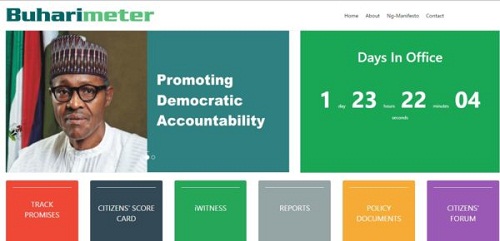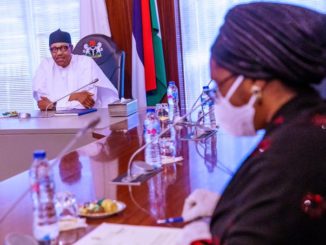 Buharimeter Opinion Poll Reveals How Nigerians Rated President Buhari below Average
Buharimeter Opinion Poll Reveals How Nigerians Rated President Buhari below Average
Overall, the 2018 Buharimeter poll revealed that 40 percent of Nigerians approve of the President’s performance while 44 percent disapprove with the remaining 16 percent neither approve nor disapprove of his performance. This implies that the President is rated below average by Nigerians. The President’s approval rating of 40 percent marks a decline of 17 percent from 57 percent rating recorded in the 2017 Buharimeter National Survey.
The poll also revealed that Federal government received ratings below average on the three cardinal campaign promises – Corruption, Security and Economy. When Nigerians were asked to rate President’s performance on Economy, 67 percent of respondents rated it poorly while 21 percent and 12 percent rated it as fair and good respectively. Compared to the 2017 National survey, 39 percent of respondents rated economic performance as poor. This is notwithstanding the country’s economic recovery arising from the increase in her Gross Domestic Product (GDP) and a decrease in inflationary rate.
On a geopolitical zone dimension, 71 percent, 82 percent and 80 percent of its sampled population rated economic performance of the incumbent administration as poor in North-Central, South-South and South-West respectively with highest recorded in the South-East (85 percent). In the North East and the North West, the economic performance of the Buhari administration was rated poor at 47 percent and 48 percent respectively. These ratings continue to follow the geopolitical divide as witnessed in previous Buharimeter polls.
According to the survey, 57 percent of sampled Nigerians rated the President’s performance as poor in the fight against corruption. This represents a 10 percent increase from the 2017 poll where 47 percent of Nigerians expressed dissatisfaction. Proportionally, the South-East (84 percent) has a more significant share of its population rating the President’s anti-corruption war as poor; followed by South-South (75 percent), South-West (73 percent) and North-Central (61 percent). Only 34 percent and 30 percent of the sampled population from North-East and North-West respectively rated the incumbent administration’s performance in the fight against corruption as good.
On security, the poll revealed that only 21 percent of sampled Nigerians rated the government’s performance as good while 24 percent and 55 percent rated it as fair and poor respectively.
In comparison, Economy received the lowest average score of 1.99, followed by corruption with 2.24; security had the highest average rating of 2.33 out of 5 of all the three cardinal campaign promises of the administration. It is important to point out that the closer the average score is to 5 the better the score.
Also, regarding sectoral performance, the effectiveness of President Buhari’s administration was also rated poorly across six sectors including Electricity, Education, Housing, Oil and Gas, Transportation and Health. However, on a brighter note, the current administration’s effectiveness on the agricultural sector was rated fairly; recording the highest average score at 2.65. Finally, the poll revealed radio and television as the primary sources of information on government activities to Nigerians.
The opinion poll was conducted in May 2018 by telephone amongst 4,000 respondents across the 36 States and the Federal Capital Territory. Interviews were conducted in five major Nigerian languages: English, Pidgin English, Yoruba, Hausa and Igbo. During the opinion poll, survey quotes were assigned, and it was ensured that every state was proportionally represented in the sample. Post-stratification gender and state weights were constructed and applied to the data to make it more representative of the population, allow for more accurate population totals of estimates and reduce non-response bias.
The weights assigned were in proportion to the 2006 Nigerian population figures. Nigerians interviewed are between 18 years and 60+ years belonging to different social class, literacy and income levels. Before the fielding of the opinion poll, a pilot poll was conducted of 30 completed interviews across the survey states to test the completeness and appropriateness of the survey tool. The margin of error does not exceed plus or minus 3 percent at the mid-range with a confidence level of 95 percent.
Buharimeter (www.buharimeter.ng) is an independent monitoring tool that enables Nigerians, scholars and political analysts around the globe to evaluate the implementation of the campaign promises of President Muhammad Buhari and his party, the All Progressives Congress (APC), made in the prelude to the 2015 general elections. Like other election pledge monitoring initiatives around the globe (such as Obameter, Mackymeter and Morsimeter), Buharimeter evolves out of the concern to address the challenges of governance, civic participation and effective service delivery in Nigeria.
Its central focus is to bridge the existing gap between the government and the governed, thereby facilitating a process through which democratic accountability becomes the norm. By analysing data gathered from multiple sources and rating the performance of the government, we hope to empower Nigerians to take an active role in making the APC-led government live up to its campaign promises. The Centre conceptualises the project for Democracy and Development (CDD-West Africa) and supported by the Open Society Initiative for West Africa (OSIWA).



